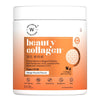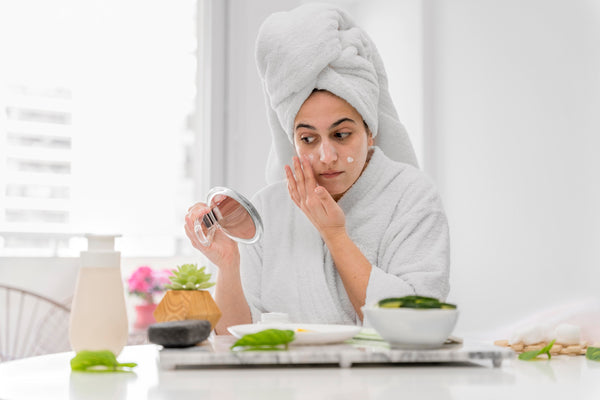Ever been tempted by skincare ads promising 'Smooth, supple skin' or 'Flawless perfection'? With new products flooding the market, it's important to know how changing your skincare routine affects your skin. Should you switch things up often, or stick to a standard skincare routine? Let's break it down: learn why a consistent routine matters, when it's okay to make changes, and how to do it smoothly."
Basic Skincare Routine
A basic skincare routine consists of cleansing, moisturizing, and protecting the skin with sunscreen. This three-step process needs to be repeated twice a day, at the beginning of each day, to prepare your skin in the morning, clear off all the impurities, and refuel it for the night. Such a basic skincare routine, along with healthy nutrition and other lifestyle habits, acts as a skin fuel that nourishes and improves its health in the long run.
Advantages of A Consistent Skincare Routine
Whether you are keen on trying a new moisturizer that promises additional glow or your hectic schedule makes it difficult to stick to your skincare routine, remember the one-thumb rule for achieving the best results: Stay consistent. When you stick to a routine, you allow your skin to gradually adapt and respond to the products. Remember, the secret to healthy skin and glow is to nourish it from within. Collagen supplements are the best way to go for youthful, glowing skin from within.
Risk of Frequent Changes in Routine
While it may be tempting to try different skincare products that are trending or promise brighter, clearer, or more youthful skin; experimenting frequently with new skincare products or changing the routine may do more harm than good. Following are certain risks of changing your skincare routine frequently.
-
Skin Irritation and Sensitivity:
Introducing new products too often can lead to skin irritation, redness, or allergic reactions. The skin needs time to adapt to new ingredients, and frequent changes can disrupt the skin's natural barrier. -
Difficulty in Identifying Effective Products:
When you change your skincare routine too often, it becomes challenging to pinpoint which products are truly beneficial for your skin. -
Waste of Products and Resources:
Frequently switching products can be wasteful, both in terms of the products themselves and the money spent on them
When to Change Your Skincare Routine
While we have established that consistency is the key to breakout-free, healthy skin, there are situations where you can think of changing your skincare routine.
-
Seasonal Changes:
As the seasons change, so do the needs of your skin. For instance, you might require more moisturizing products in the winter compared to the summer. -
Age-Related Changes:
As you age, your skin changes, and so might your skincare needs. Products that worked in your twenties might not be as effective in your forties. -
Lifestyle or Health Changes:
Factors like diet, stress, hormonal changes, or medications can affect your skin, necessitating adjustments in your skincare routine. -
Lack of Results:
If you've been consistent with a product for several weeks or months without seeing the desired results, it may be time to consider using a higher-strength product or a new alternative altogether.
Smoothly Transitioning Your Skincare Routine
If you’ve decided to make a change in your skincare routine, let it be gradual and a step-by-step process. Keep the following guidelines in mind.
-
Check Purity & Potency:
The first step while transitioning is to opt for authentic skin care products. This is true for all skincare essentials - creams and elixirs. For example, when buying a collagen supplement or consuming skin essential nutrients via effervescent tablets. The better the ingredients' grade, the lesser the chance of side effects and the higher the chance of its efficacy. -
Patch Test:
Before fully integrating a new product into your routine, do a patch test to check for adverse reactions. -
One Product at a Time:
Introduce one new product at a time and give it a few weeks before adding another. This approach helps identify how your skin reacts to each product. -
Research and Consultation:
Research the products and their ingredients. Consulting a dermatologist can also provide insights into what products may work best for your skin type. -
Understand Your Skin's Needs:
Be attuned to your skin’s needs rather than following trends. Choose products based on what your skin requires, not what is popular or has worked for someone else.
Importance of Customizing Skincare Routines
Just like one size doesn't fit all, that skin toner that did wonders for your friend's skin tone may not be as effective for you, or her skincare routine may be different than what your skin needs. Remember to tailor your skincare routine as per your skin type and a one that goes perfectly with your skin. Your skin is unique and so should your skincare routine.
Summing Up!
Even while it might be tempting to switch up your skincare regimen and products regularly, doing so is only sometimes good for your skin. A consistent skincare routine allows your skin to maintain balance and effectively absorb the nutrients and benefits of the products. However, it’s also important to recognize when changes are needed due to factors like seasonal shifts, aging, or changes in skin health. Remember to complement your skincare routine with skin-nourishing products for a holistic glow. Introducing new products should be done thoughtfully and one at a time, with attention to how your skin reacts. Remember, the best skincare routine is one that is tailored to your unique skin needs, providing the right skin fuel and essential nutrients for healthy, glowing skin.
References
https://www.nm.org/healthbeat/healthy-tips/do-you-really-need-a-skin-care-routine
https://www.ncbi.nlm.nih.gov/pmc/articles/PMC5172479/
https://www.aad.org/public/everyday-care/skin-care-basics/care/skin-care-tips-dermatologists-use
https://www.aad.org/public/everyday-care/skin-care-secrets/routine/healthier-looking-skin
https://www.cdc.gov/hygiene/personal-hygiene/face.html
https://www.pennmedicine.org/updates/blogs/health-and-wellness/2022/march/the-truth-about-wrinkles





























